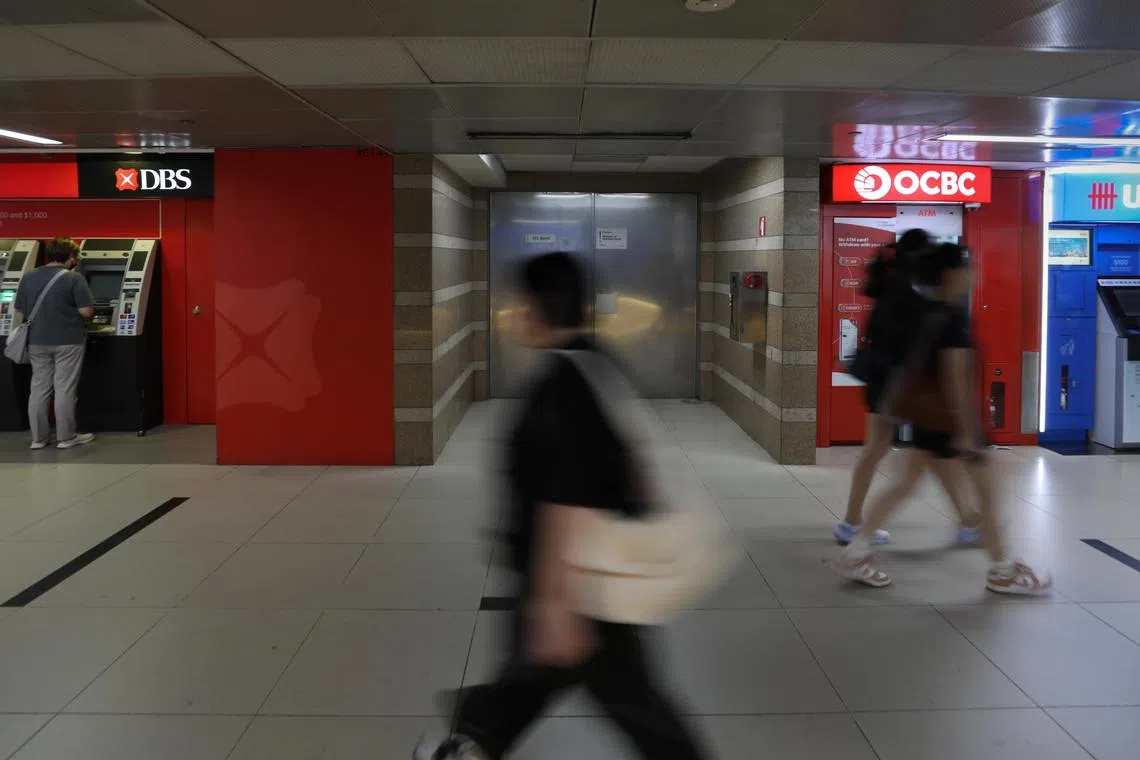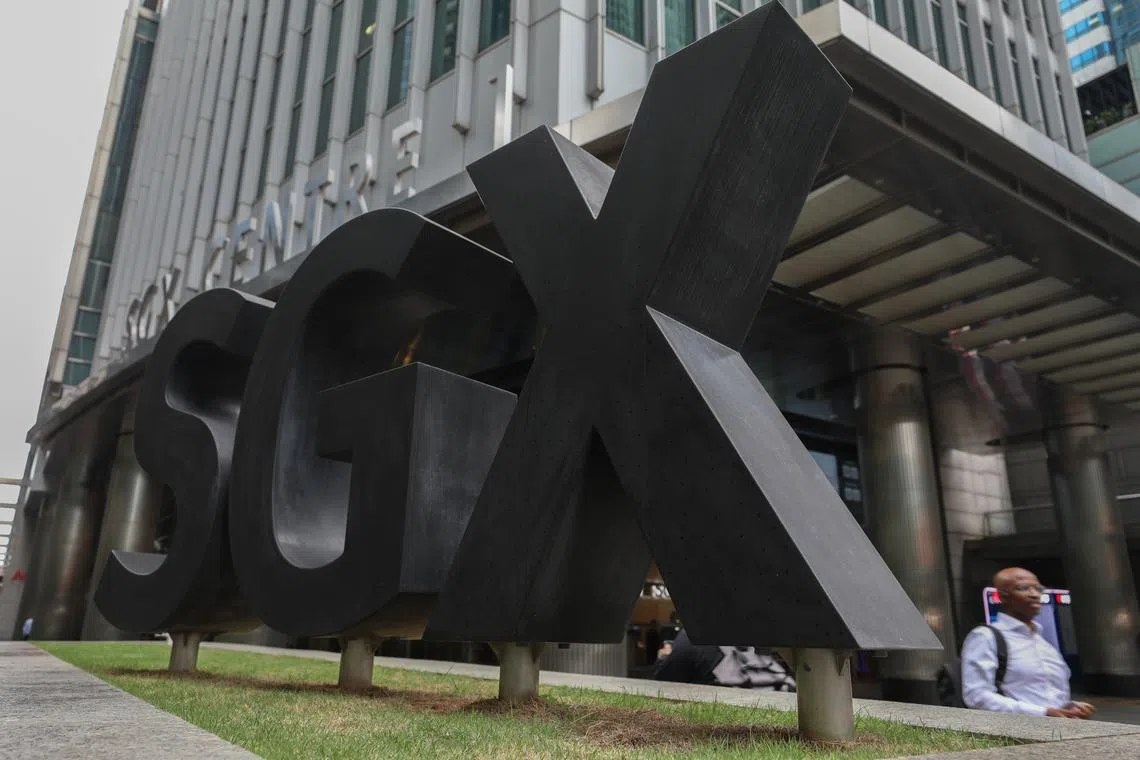Market Insights
DBS shares hit $50 record after 1% rise in Q2 profit; some analysts think stock could hit $57
Sign up now: Get ST's newsletters delivered to your inbox

At least four analysts have upgraded their target prices on DBS, with Goldman Sachs valuing the stock at $57.20, although some were less bullish.
PHOTO: THE BUSINESS TIMES
SINGAPORE – Shares of Singapore’s biggest bank crossed $50 for the first time after it announced its results for the second quarter of 2025 last week, prompting a flurry of target price upgrades by analysts who cover the stock.
DBS Bank on Aug 7 reported a 1 per cent rise in second-quarter net profit to $2.82 billion for the three months to June 30, exceeding analyst forecasts, due to strong wealth fees and trading income.
An interim dividend of 60 cents and a capital return dividend of 15 cents per share were declared, totalling about $2.13 billion.
DBS chief executive Tan Su Shan said at a results briefing that the bank was able to offset lower interest rates and tariff headwinds with strong balance sheet management and deposit growth.
At least four analysts have since upgraded their target prices on DBS, with Goldman Sachs valuing the stock at $57.20, the highest on the street. Some were less bullish though, with J.P. Morgan and Morningstar warning that the bank will need much stronger catalysts to justify valuations beyond their current level.
The stock hit an all-time high of $50.98 on Aug 8
In contrast, rival bank UOB’s shares closed lower
UOB declared an interim dividend of 85 cents a share for the half-year, down from 88 cents a year ago. Shareholders will also receive the second tranche of a special dividend of 50 cents per share – part of a capital distribution package announced in February.
The lender also adjusted its earnings outlook to prepare investors for a more volatile year.
At its results briefing, UOB chief executive Wee Ee Cheong linked the bank’s trimmed outlook to muted growth in its Asean markets from tariff impacts. While the first-order effects are seen as manageable, he warned of second-order risks to consumer spending and investment.
Shares of UOB closed on Aug 8 at $35.70, down by more than 1 per cent through the week.
Yangzijiang, SGX report strong earnings
Yangzijiang Shipbuilding led the Straits Times Index (STI) last week after posting a record net profit of 4.2 billion yuan (S$752.6 million) for the six months to June 30, up 36.7 per cent from a year earlier.
This was despite a 1.3 per cent dip in first-half revenue to 12.9 billion yuan, the company said on Aug 7.
Yangzijiang said the shipbuilding industry is expected to face headwinds moving forward, with global shipbuilding contracting in the first half of 2025 amid concerns over US tariffs and proposed US port fees.
Despite this, clearer tariff developments and improved sentiment in the second half should continue to spur new orders, it said.

SGX shares closed the week flat at $16.02 despite strong results and a firmer outlook, with over 30 companies in the IPO pipeline having already hired advisers.
PHOTO: BT FILE
Yangzijiang also secured US$537.2 million (S$690.7 million) in contracts for 14 vessels, 85 per cent of them container ships, in the first half, and has a US$23.2 billion outstanding order book stretching to 2029 and beyond.
Shares of the shipbuilder closed on Aug 8 at $2.87 each, up by more than 13 per cent through the week.
The other STI company to report strong results last week was the Singapore Exchange (SGX).
For the 12 months to June 30, net profit rose 8.4 per cent year on year to $648 million on increased trading volumes across commodities, equities and currencies.
The bourse operator also posted its highest revenue since 2000, at $1.3 billion – an 11.7 per cent increase from financial year 2024.
At its results briefing, SGX officials noted that prospects for the exchange have also improved.
Listing momentum has picked up, for one thing, and more than 30 companies in the initial public offering pipeline have already hired advisers, SGX head of global sales and origination Pol de Win said.
He added that more are still contemplating going public on the SGX mainboard as well as Catalist. This is before some $1.1 billion in state funds allocated to three fund managers for investing in local stocks is deployed later in 2025.
Despite the strong results and firmer outlook, SGX shares closed the week flat at $16.02.
Sembcorp, Genting show weaker report cards
Sembcorp Industries was among the laggards on the STI last week.
The company’s shares fell 13.9 per cent to close at $6.72 on Aug 8, despite posting a net profit of $536 million for the half-year ended June 30.
While this was down 1 per cent from the same period a year ago, the company still declared a higher interim dividend of nine cents a share, compared with six cents before.
Ms Carmen Lee, head of OCBC Investment Research, told The Straits Times the steep decline in Sembcorp’s share price could be due to the fall in the company’s revenue, down 8 per cent year on year to $2.9 billion and coming in short of market expectations.
Shares of Genting Singapore rose 2 per cent through the week to close on Aug 8 at 74.5 cents.
This was despite the resort and casino operator reporting a 34 per cent drop in profit for the first half of the year to $234.7 million on Aug 7. Revenue fell by 10 per cent to $1.2 billion.
According to Genting, the decline was driven by weaker gaming and room revenues as well as higher operating costs and the temporary closure of the SEA Aquarium in May and June to facilitate the opening of the Singapore Oceanarium.
Other market movers
Singapore Airlines dropped 4.4 per cent after going ex-dividend on Aug 8. It will be paying a final dividend of 30 cents on Aug 27, and closed the week at $6.53.
The carrier’s share price had already taken a hit in July after it reported a 59 per cent year-on-year slide in earnings to $186 million for the first quarter of its financial year ended June 30.
This was mainly due to its share of associate Air India’s losses in the wake of the fatal crash of Flight 171 in Ahmedabad on June 12, which led to a drop in bookings and significantly lower airfares.
Shares of student accommodation operator Wee Hur hit an all-time high of 74 cents on Aug 6, following news that Australia will raise its cap on foreign students by 9 per cent to 295,000 in 2026 and prioritise applicants from South-east Asia.
Wee Hur has eight facilities for purpose-built student accommodation in Australia.
Its shares ended the week at 69 cents.
Singapore Post rose 2 per cent to close at 50.5 cents last week.
The company on Aug 7 sold 10 Housing Board shophouses for $55.5 million.
SingPost said in an Aug 8 bourse filing that a preferred bid had been identified for the properties from a company owned by Mr Teo Kiang Ang, founder and non-executive chairman of gas utilities provider Union Gas.
Mr Teo is also chairman and founder of taxi service provider Trans-Cab.
The move is part of SingPost’s plan to divest its non-core assets while retaining its current post office services.
What to look out for this week
City Developments and ComfortDelGro will announce their first-half results on Aug 13 while CapitaLand Investment reports on Aug 14.
Shares of construction company Koh Brothers and real estate agency Apac Realty could see some trading activity after both companies announced strong first-half results after the market closed on Aug 8.
PC Partner could also see some trading interest. The electronics distributor on Aug 9 announced it had received in-principle approval from SGX to convert its secondary listing in Singapore to a primary one, after which it will delist from the Hong Kong stock exchange.



